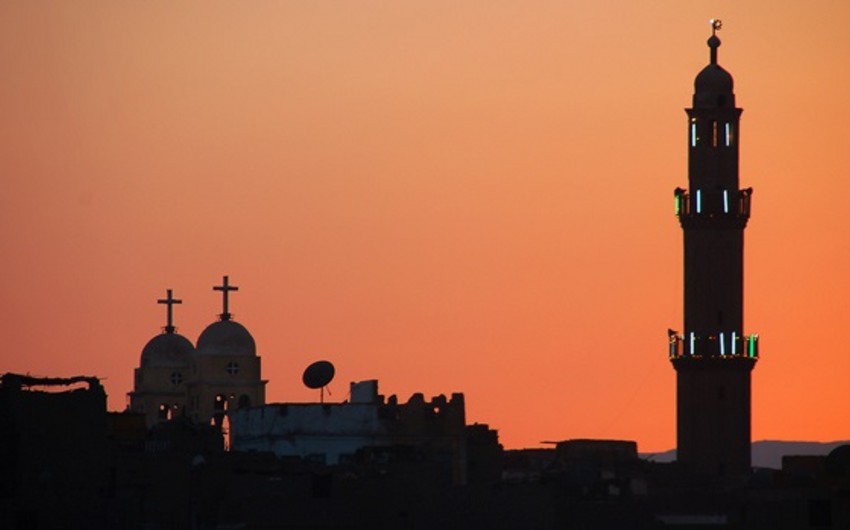Baku. 25 August. REPORT.AZ/ Report presents article about finding a multifaith model in a secular muslim society by expert Rabbi Abraham Cooper.
Forty-four years ago, I spent the Jewish High Holy Days in what was then the Soviet Union. The Cold War was raging and life under Brezhnev and Kosygin for believers in that officially atheistic society was barely tolerated. The majority of synagogues, churches, and mosques had been shuttered or destroyed.
Yom Kippur services at the Moscow Choral Synagogue was a deeply emotional but depressing experience. Memories of elderly survivors of two tyrants, Hitler and Stalin who openly cried at the sight of two young American Jews but who were too afraid to even approach us, lest they would be caught cavorting with foreigners by ever-present KGB operatives.
My life-long friend David Koenigsberg and I spent the Sukkot Festival in Baku, the sunny capital of the then Azerbaijan SSR. There, we met a cross-section of Jews ranging from Polish Jews who fled the Nazis to Jews who traced their ancestry back to the destruction of Solomon’s Temple, some 2,500 years ago. Still, it was difficult to escape the harshness of the full power of Communism trying to crush religions and stamp out all faith.
Well, 2016 presents us a dramatically changed world. The “godless” Soviet Union is no more and for most people today “Cold War” is relegated to a multiple choice question on a history quiz.
But back in the dark days of the Iron Curtain, religion and religious leaders often served as points of light and beacons of hope in the struggle for human freedom.
In 2016, more often than not, religion is seen, not as source of light and hope but as a legitimizer of conflict, of division and violence, even rape and terrorism.
Now in the 40th year at the Simon Wiesenthal Center, I spend my life focusing on building awareness of the dangerous hatred and social injustice in the world; of urging people to choose the lessons of Memory over the statistics of history; to remind people never to forget what evil human beings are capable of. And most importantly to look for mentors and partners to promote an environment of tolerance and mutual respect.
I have been luckier than most, having watched Jewish refuseniks stand up to the power of the state to reclaim their spiritual heritage; to have known and learned from the great Nazi hunter, Simon Wiesenthal, to have sat with Pope John Paul II in his private chapel and witness the value of one life, shortly before his death; to have known the late Indonesian President Wahid, who personified true Interfaith values.
Interestingly, my global travels in search of moderates and partners has led me back to Baku, the capital of now independent Republic of Azerbaijan. For all its foibles, this majority-Muslim nation stands out for its embrace of multiculturalism and protection of the rights of its citizens to be able to leave their homes on Friday, Saturday, or Sunday, go to the House of Worship of their choice and return in peace to their homes. How interesting that this country declared 2016 as the Year of Multiculturalism.
I recently flew on Azerbaijan Airlines from Tel Aviv to Baku. This is a nation that has steadfastly stood by Israel as well in a time of great upheaval. This distinct and consistent brand of domestic and foreign policy has yielded positive results, historically and today. Azerbaijan has historically been a safe haven for Jews and Christians, arguably, the most successful survivor of nearly a century of Soviet power, and for decades since their independence, one of Israel’s and the United States’ most loyal and risk-taking friends.
One of my heroes who has done so much to foster Interfaith harmony and tolerance, is a respected secular scholar, Dr. Kamal Abdullayev, Azerbaijan’s State Counselor on Multiculturalism, who told me that “the success of harmonic diversity has a cyclical payoff; a framework that was strong enough to reemerge with democracy, and in the realm of what is possible today, to aggressively build on a platform that simultaneously strengthens the health and prospects of our diverse communities while keeping radicalism far away, despite how geographically close it is.”
So against the backdrop of hate and terrorism, and growing numbness towards violence, the concept of conscious engagement can be vital. Engagement that not only looks to support those that support our values, but an awareness that we must honor and promote ways to build positive models of interfaith dialogue so that young people will be inspired to see the goodness, not hate in others.
We are all struggling with a new learning curve on the international stage, as Social media platforms change the rules of the marketplace of ideas in real time.
Azerbaijan is not the perfect model; but that’s hardly the point. But in a region where Christians have been ethnically-cleansed in Iraq, where Baha’is are persecuted in Iran, where ISIS proudly broadcasts its Medieval brutalities, we can learn a great deal from every leader who has the courage to safeguard and respect religious minorities.


 https://static.report.az/photo/bbd5ef29-fd63-45ff-ab43-49e378265a3d.jpg
https://static.report.az/photo/bbd5ef29-fd63-45ff-ab43-49e378265a3d.jpg

